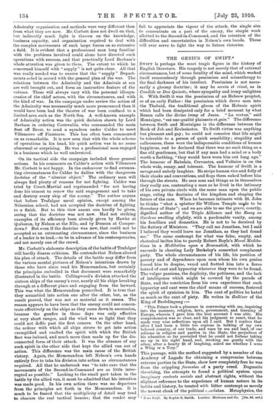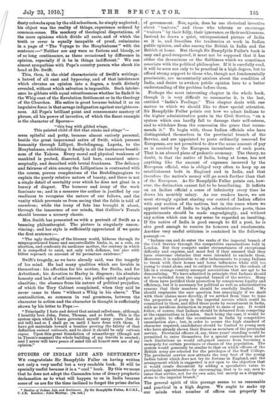THE GENIUS OF SWIFT.* SWIFT is perhaps the most tragic
figure in the history of English literature. His tragedy is not merely that of external circumstances, but of some fatality of the mind, which worked itself remorselessly through pessimism and misanthropy to the final darkness of his intellect. Pessimism is not neces- sarily a gloomy doctrine ; it may be serein et riant, as in Candide or Don Quixote, where sympathy and irony enlighten it. With Swift it was the pessimism of an Hebrew prophet, or of an early Father: the pessimism which drove men into the Thebaid, the traditional gloom of the Hebraic spirit which had been dissipated only for a brief moment by what Renan calls the divine irony of Jesus. " La vertue," said Montaigne, " est une qualite plaisante et gaie." The difference between Swift and Montaigne is the difference between the Book of Job and Ecclesiastes. To Swift virtue was anything but pleasant and gay; he could not conceive that life might be tolerable to a person of quick sensibility ; stupidity and callousness, these were the indispensable conditions of human happiness, and he declared that there was no such thing as a fine old gentleman, but that if any man had a mind or a body worth a farthing, "they would have worn him out long ago." The humour of Rabelais, Cervantes, and Voltaire is on the whole wide, sunny, and tolerant. The humour of Swift is a savage and unholy laughter. He strips human vice and folly of their cloaks and conventions, and flogs them naked before him through the streets. He sees men and things as in themselves they really are, contrasting a man as he lived in the intimacy of his own private circle with the same man upon the public stage, ruling the destinies of the kingdom and shaping the future of the race. When he becomes intimate with St. John he thinks "what a splutter Sir William Temple male to be Secretary of State"; and we are able to see the grave, courtly, dignified author of the Triple Alliance and the Essay on Gardens swelling slightly, with a pardonable vanity, among his familiars and domestics. He is not to be deceived by the flattery of Ministers. "They call me Jonathan, but I said I believed they would leave me Jonathan, as they had found me." The same contempt for what was false, empty, and rhetorical incites him to parody Robert Boyle's Moral Medita- tions in a Meditation upon a Broomstick, with which he succeeds in cheating Lady Berkeley's somewhat complacent piety. The whole circumstances of his life, his position of poverty and of dependence upon men whom his own genius forced him to despise, vexed and fretted him into 'a fierce hatred of cant and hypocrisy wherever they were to be found.
The vulgar passions, the duplicity, the pettiness, and the lack of intelligence which might be covered by the parade of State, and the conviction from his own experience that such hypocrisy and cant were the chief means of success, fostered the spirit of cynicism in him. The cant of politics he hated as much as the cant of piety. He writes in Gulliver of the King of Brobdingnag
"This Prince took a pleasure in conversing with me, inquiring into the manners, religion, laws, government, and learning of Europe, wherein I gave him the best account I was able. His comprehension was so clear, and his judgment so exact, that he made very wise reflections upon all I said. But I confess that after I had been a little too copious in talking of my own beloved country, of our trade, and wars by sea and land, of our schisms in religion and parties in the State, the prejudices of his education so far prevailed that he could not forbear taking me up in his right hand, and, stroking me gently with the other, after a hearty fit of laughing, asked me whether I were a Whig or a Tory."
This passage, with the method suggested by a member of the Academy of Lagado for obtaining a compromise between extreme parties in the State, show how completely free he was from the crippling formulae of a party creed. Dogmatic theorising, the attempts to found a political system upon imaginary contrats socials and abstract rights, without the slightest reference to the experience of human nature in its habits and history, he treated with bitter contempt as merely the newest cloak of the political cjarlatan. Metaphysics, the ' D‘an Swift. By Sophie S. Smith. London : Methuen and Co. [103. 6d. net.]
dusty cobwebs spun by the old schoolmen, he simply neglected ; his object was the reality of things, experience ordered by common-sense. His mockery of theological disputations, of the mere opinions which divide all sects, and of which the truth or error is equally incapable of proof, culminates in a page of " The Voyage to the Houyhnhnms " with the sentence :—" Neither are any wars so furious and bloody, or of so long continuance, as those occasioned by difference in opinion, especially if it be in things indifferent." We can almost sympathise with Pope's country parson who shook his head at Dr. Swift.
This, then, is the chief characteristic of Swift's writings : a hatred of all cant and hypocrisy, and of that intolerance which elevates an opinion into a dogma, a truth divinely revealed, without which salvation is impossible. Such intoler- ance he gibbets with equal relentlessness whether he finds it in the Whig cant of the Revolution Settlement or in the theology of the Churches. His satire is great because behind it as an impulsive force is that savage indignation against unrighteous- nese. All Pope's brilliant point and consummate mastery of phrase, all his power of invective, of which the finest example is the character of Sporus-
" this bug with gilded wings, This painted child of dirt that stinks and stings"— seem spiteful and petty, because almost entirely personal, beside the great impersonal satire of Swift, which pursues humanity through Lilliput, Brobdingnag, Laputa, to the
Houyhnhnms, exhibiting it finally in all the loathsome beastli- ness of the Yahoos. Every moral and physical weakness of mankind is probed, dissected, laid bare, examined micro- scopically, and described with brutal frankness. The delicacy and fairness of skin among the Lilliputians is contrasted with the course, porous complexions of the Brobdingnagians to
explain the purely relative nature of beauty, and there is not a single detail of mortality over which he does not gloat in a
luxury of disgust. The humour and irony of the work fascinate us ; and in a measure the author is justified by ow• readiness to recognise the nature of our fellows, and the vanity which prevents us from seeing that the fable is told of ourselves; while the irony of fate has brought it about, through the innocence of our minds, that Gulliver's Travels should become a nursery classic.
Mrs. Smith has presented us with a portrait of Swift as a beaming philanthropist. The picture is singularly uncon- vincing ; and her style is sufficiently appreciated if we quote the first sentence :—
"The ugly duckling of the literary world, hideous through its misproportioned frame and uncontrollable limbs, is, as a rule, an abortion, and confronts its mediocre mother, the century in which it is compelled to exist, not only with defiance, but also with bitter reproach on account of its premature existence."
Swift's tragedy, as we have already said, was the tragedy of his mind. He had many qualities which are lovable in themselves : his affection for his mother, for Stella, and for Arbuthnot; his devotion to Harley in disgrace; his absolute honesty and lack of self-interest ; his public spirit and private charities ; the absence from his nature of political prejudice, of which the Tory Cabinet complained, when they said he never came to them "without a Whig in his sleeve." The contradiction, so common in real greatness, between the character in action and the character in thought is sufficiently
shown by his letter to Pope:— "Principally I hate and detest that animal called man; although I heartily love John, Peter, Thomas, and so forth. This is the system upon which I have governed myself many years (but do not tell) and so I shall go on until I have done with them. I have got materials toward a treatise proving the falsity of that definition animal rationale, and to show it should be only rations capes. Upon this great foundation of misanthropy (though not in Timon's manner) the whole building of my travels is erected ; and I never will have peace of mind till all honest men are of my opinion."







































 Previous page
Previous page